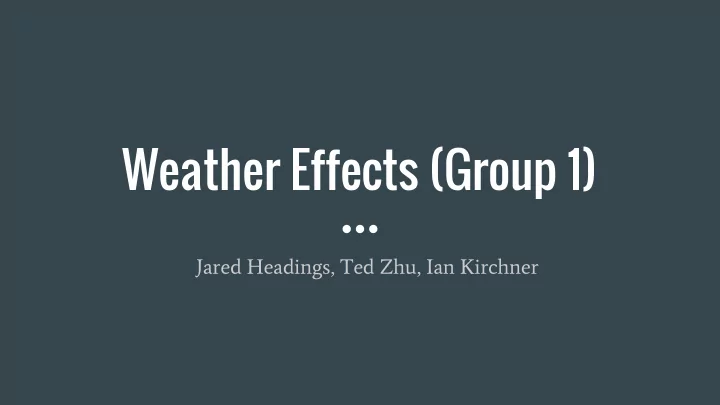

Weather Effects (Group 1) Jared Headings, Ted Zhu, Ian Kirchner
Weather in Games Audio and Visual Effect Direct Change to Play
Weather as a Visual Effect
Weather Affecting Play - Both Simple, and Complex https://youtu.be/PeT8hU6Jo0I?t=22s
GTA V: Highly complex weather system! ● Default: Cloudy weather, no adverse effects on gameplay ○ Every 2-4 in-game days: Sunny weather, no adverse ○ effects on gameplay Every 3-5 in-game days: Rainy weather of random ○ intensity Rainstorms in GTA are masterpieces ● Water pools up on low spots in roads ○ Less stability in vehicles/risk of hydroplaning ○ Will start as a drizzle, gradually build in intensity, then ○ taper off Lights will dynamically turn off in whole sections of the ○ game, simulating power outages Controller vibrations during thunder ○
Complexity can come at a price... Can be expensive ● Time consuming to implement ● Can cause massive FPS drops... ●
So why do we have weather in games?
Weather == Immersion “The more familiar everything feels, the less we notice the ● machinery behind the illusion.” The mystical “suspension of disbelief” ● DriveClub - https://www.youtube.com/watch?v=hViwrRGfuHU ●
Immersion Games lacking immersion can make it ● harder for you to suspend your disbelief ● Physics-based, realistic weather is a great way to gain immersion! ○ It’s what we experience every day.
Creating Realistic Weather 100% realism = 100% immersion
Modeling Weather Weather is a highly complex system Requires flow modeling along a 3D grid
Modeling Weather Large number of factors to model ● Relative Humidity ○ Temperature ○ Wind ○ Convection ○ Radiation ○ Many different scales to consider ● Global ○ ○ Regional Local ○
Parameterization Resolution can only get so high ● Computationally impossible at certain point ○ Large scale simulation requires supercomputers ● Highest resolution uses grid cells of ~5km 3 ● ● Requires Parameterization ○ Abstracting the internal processes of cells
IAN DEMO
Modeling Weather in Games Add Levels of Abstraction ● Static weather ○ Markov Model ○ Temperature/Humidity/Wind curves ○ Easier to create, easier to simulate ● Provides a “good enough” ● approximation
Static Weather Predefine weather for areas in the game ● Pros ● ○ Allows for the most control Easiest to implement ○ Cons ● Not adaptable ○ Detracts from a sense of a living world ○
Markov Model Define all weather states ● Clear ○ Cloudy ○ Overcast ○ Rain ○ Storm ○ Define each state’s transition ● probability Transition to new weather on a timer ●
Markov Model Pros ● Provides control while still having ○ weather transitions Not very complex ○ Cons ● Difficult to find average rain chances ○ Requires additional interpolation for ○ weather transitions
Weather Feature Curves Create or generate curves for various ● features ○ Wind Temperature ○ ○ Humidity Etc. ○ Sample these at a given rate ● Combine the samples for weather ● Temp > 0 ^ Humd > 65 => rain ○
Weather Feature Curves Pros ● Transitions are more smooth ○ Capable of more realism ○ Cons ● ○ Difficult to control Difficult to implement ○
Physically Based Simulation
Representing Physical Objects Meshes ● used in 3D games to represent solid objects. ○ computationally expensive in simulations ○ Sprites ● used in 2D games ○ manually programmed without physics-based simulation ○ Particle Systems ● simple images or meshes moved in great numbers ○ depict entities that are fluid and intangible in nature ○ e.g., liquids, smoke, flames, clouds ○
Particle Systems, in depth. Each particle represents a small portion of a fluid ● All the particles together form an impression of the complete entity being ● represented E.g., A cloud, tornado, mist ○
Particle Systems vs. the Particle Particle System Particle A Particle Emitter Lifetime ● ● Some 3D mesh or shape Usually a few seconds ○ ○ Emission rate Velocity vector ● ● particles/second Affected by forces acting on ○ ○ the system Emission position ● on mesh Appearance ● Usually randomized Size, color, rotation ○ ○
Particle Systems in Unity A Particle System can act as its own ● GameObject, Or a Component of an existing ● GameObject. Unity provides several ways to ● customize its behavior. Caveat: Cannot apply user-defined ● forces on given particles.
Custom Particle Systems Need to create own Particle ● Object to perform arbitrary force manipulations on particles. Custom particle system ● needed for simulation of a tornado.
Fluid Dynamics Simulation "DYNAMICAL MODELING OF A TORNADO" Steven Torrisi, 2015 where u is the fluid velocity vector, p is the pressure, f are other body forces such as gravity, and Re is the Reynolds number (viscosity)
Custom Particle Systems
TED DEMO
Bibliography http://gamestudies.org/0801/articles/barton http://docs.unity3d.com/Manual/ParticleSystems.html http://rams.atmos.colostate.edu/at540/fall03/fall03Pt7.pdf https://www.assetstore.unity3d.com/en/#!/content/2714 https://gamedev.stackexchange.com/questions/20564/algorithm-for-randomized-weather
Recommend
More recommend